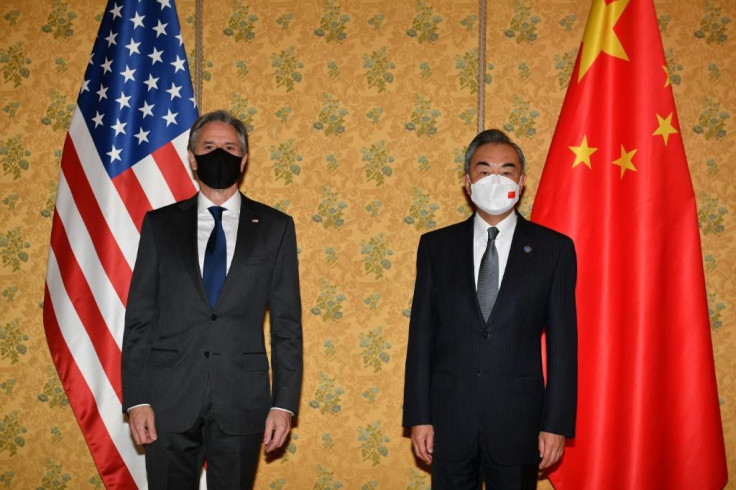China urges US to keep promises on Taiwan
Stoking Beijing's ire, Taipei confirmed for the first time this week that US troops were training Taiwanese forces on the island.
Chinese Foreign Minister Wang Yi told the United States not to "betray its promises" on Taiwan at a rare meeting Sunday with Secretary of State Antony Blinken, as tensions run high over the island.
Months of simmering tensions spiked in October after President Joe Biden declared that the United States would defend Taiwan in the event of an attack by Beijing -- a statement seemingly at odds with long-held American policy towards the self-ruling island.
The White House quickly walked back Biden's comments -- insisting there has been no policy change -- and both sides Sunday stressed the need to keep channels of communication open to avoid any dangerous souring of relations.
But Wang voiced Beijing's full displeasure in his talks with Blinken, on the sidelines of the G20 summit in Rome.
"We request that the US pursues a real One China policy, not a fake One China policy," Wang told his counterpart, according to a Chinese foreign ministry statement.
"We request the US to fulfil its commitments to China, rather than betray its promises."
According to a senior State Department official, Blinken made clear to Wang that there has been no change to Washington's so-called One China policy -- which is the diplomatic acknowledgement of Beijing's position that there is only one Chinese government.
The military element of the US approach -- set out by the 1979 Taiwan Relations Act and known as "strategic ambiguity" -- requires the United States to help build Taiwan's defenses but does not explicitly promise to come to its help in the event of war.
Speaking later on CNN, Blinken reiterated that there was "no change" in policy, saying Washington remained "resolutely committed" to making sure Taiwan has the ability to defend itself against any aggression.
The meeting marked the first between the two top diplomats since a stormy session in Alaska in March, when the Chinese delegation berated the American side as TV cameras rolled.
It follows weeks of escalating diplomatic rhetoric and military posturing over Taiwan, an island of 23 million which China claims as its own and vows to retake one day -- by force if necessary.
Wang stressed that Taiwan was "the most sensitive" issue between Beijing and Washington, with the potential to wreck relations if dealt with "wrongly", the Chinese foreign ministry statement added.

Stoking Beijing's ire, Taipei confirmed for the first time this week that US troops were training Taiwanese forces on the island.
That came after Blinken called for Taiwan to be allowed greater involvement in UN agencies.
Potentially adding to the unease, the State Department said Sunday that 1.5 million more doses of Moderna's Covid-19 vaccine were bound for Taiwan.
"Our donation reflects our commitment to Taiwan, a vibrant democracy, valued partner, and trusted friend," State Department spokesman Ned Price tweeted.
The world's two biggest economies -- and strategic rivals -- have been squaring off for months on multiple fronts, from trade to human rights, and the Covid-19 pandemic.
In the meeting, Blinken raised concerns over human rights, expressing opposition to actions by China "that run counter to our values and interests... including actions related to human rights, Xinjiang, Tibet, Hong Kong, the East and South China Seas, and Taiwan," the State Department's Price said in a statement.
But on Sunday, both sides appeared to strike a conciliatory tone on other issues, with Wang expressing interest in establishing regular contact with his American counterpart to help resolve problems.
Blinken noted areas where he said American and Chinese interests intersect and they can work together as well, including "the DPRK (North Korea), Burma, Iran, Afghanistan, and the climate crisis."
"Secretary Blinken underscored the importance of maintaining open lines of communication to responsibly manage the competition between the United States and the People's Republic of China," the State Department said.
Biden has pressed ahead with a hardline trade policy against Beijing broadly in line with that of his predecessor Donald Trump, whose bombastic approach sent tensions soaring.
In the latest illustration of that policy, Washington recently ordered China Telecom Americas to discontinue its services within 60 days -- ending nearly two decades of operations in the country and piling further strain on bilateral relations.
Copyright AFP. All rights reserved.
This article is copyrighted by International Business Times, the business news leader





















